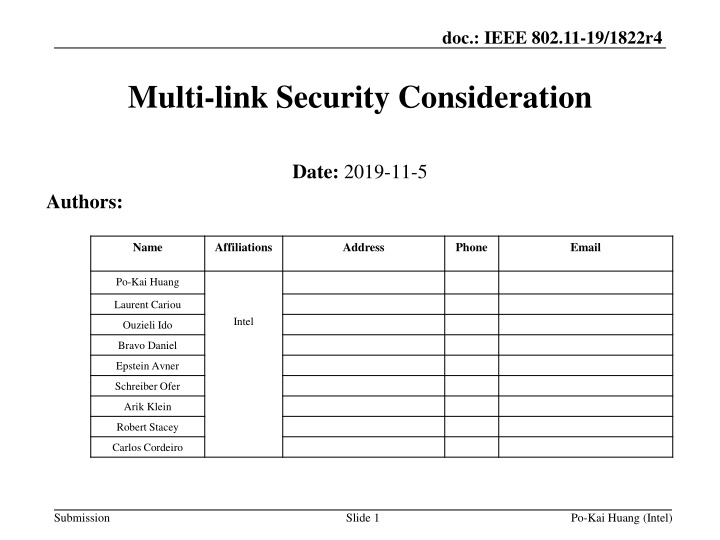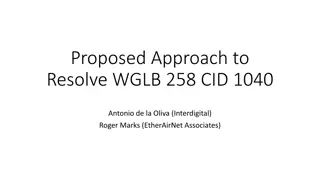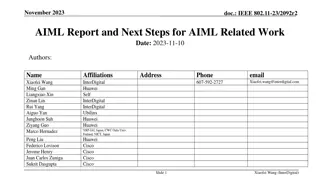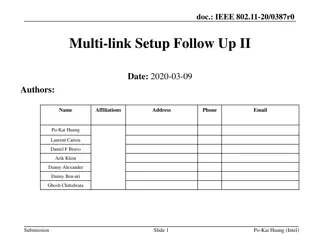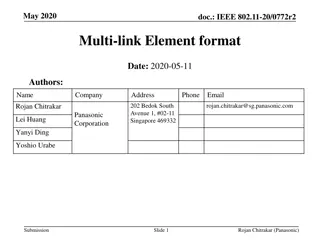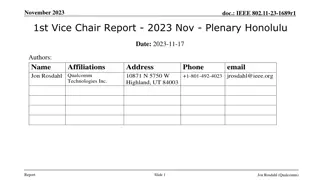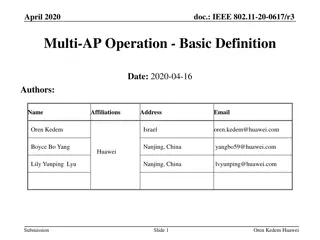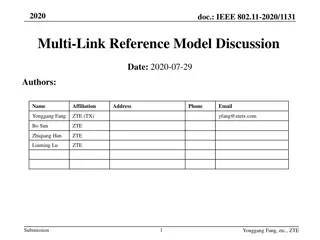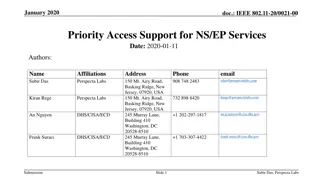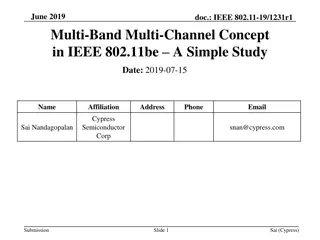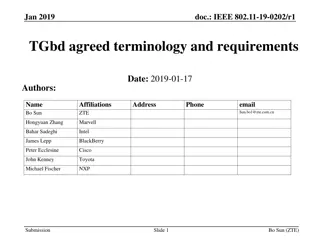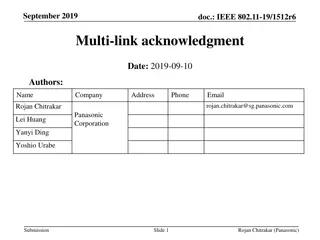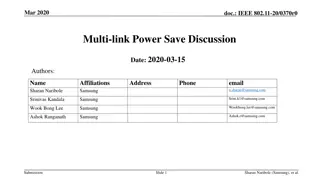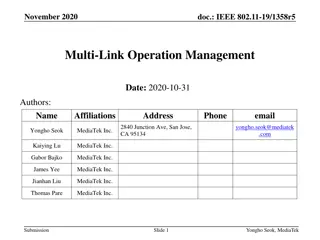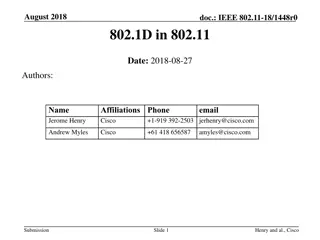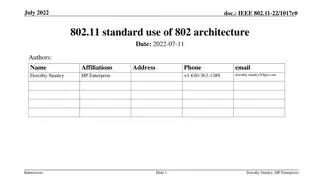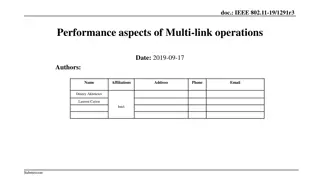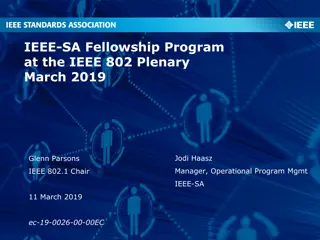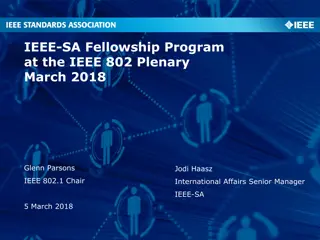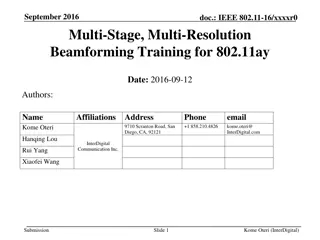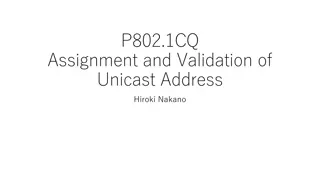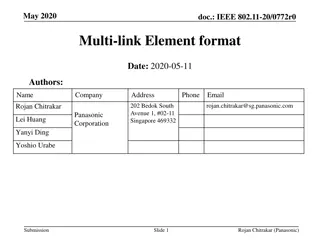IEEE 802.11-19/1822r4 Multi-link Security Consideration
This document discusses the security considerations related to multi-link frameworks in IEEE 802.11-19/1822r4. It covers topics such as the use of different keys for different links, key generation methods, and potential replay attacks across links. The focus is on enhancing security in multi-link setups to avoid vulnerabilities like replay attacks and maintain separate security domains across different links.
Download Presentation

Please find below an Image/Link to download the presentation.
The content on the website is provided AS IS for your information and personal use only. It may not be sold, licensed, or shared on other websites without obtaining consent from the author.If you encounter any issues during the download, it is possible that the publisher has removed the file from their server.
You are allowed to download the files provided on this website for personal or commercial use, subject to the condition that they are used lawfully. All files are the property of their respective owners.
The content on the website is provided AS IS for your information and personal use only. It may not be sold, licensed, or shared on other websites without obtaining consent from the author.
E N D
Presentation Transcript
doc.: IEEE 802.11-19/1822r4 Multi-link Security Consideration Date: 2019-11-5 Authors: Name Affiliations Address Phone Email Po-Kai Huang Laurent Cariou Intel Ouzieli Ido Bravo Daniel Epstein Avner Schreiber Ofer Arik Klein Robert Stacey Carlos Cordeiro Submission Slide 1 Po-Kai Huang (Intel)
doc.: IEEE 802.11-19/1822r4 Background Multi-link framework and setup has been discussed [1,2] We discuss the security consideration in this presentation AP MLD Non-AP MLD AP1 AP1 STA1 AP2 STA2 Response frame for multi-link setup Request frame for multi-link setup AP3 STA3 Non-AP STA1 Submission Slide 2 Po-Kai Huang (Intel)
doc.: IEEE 802.11-19/1822r4 Scope of Multi-link Security Consideration Expect that 4-way handshake or group key handshake will be reused The discussion points are: GTK/IGTK/BIGTK Same key or different key for different links Key generation method PTK Same key or different key for different links Key generation method Submission Slide 3 Po-Kai Huang (Intel)
doc.: IEEE 802.11-19/1822r4 Consideration of GTK/IGTK/BIGTK We think that replay attack of group addressed data frame, group addressed management frame, or beacon frame across links shall be avoided Replaying group addressed data frame sent in one link in another link messes up the replay counter used by the legacy STAs to receive group addressed data frame Replaying group addressed management frame like disassociation frame sent in one link in another link messes up the BSS operation for legacy STAs Replaying Beacon frame sent in one link in another link may mess up the capability and TSF indication Replay attack across links may happen if AP MLD uses same MAC addresses and same GTK/IGTK/BIGTK across links AP MLD Non-AP MLD Non-AP 1 AP1 Disassociation Link 1 Non-AP 2 AP2 Disassociation Link 2 Replayed by the attacker Submission Slide 4 Po-Kai Huang (Intel)
doc.: IEEE 802.11-19/1822r4 Consideration of GTK/IGTK/BIGTK Even if AP MLD uses different MAC addresses across links, there are still benefits for using different GTK/IGTK/BIGTK across links Refreshing key in one link due to whatever reasons does not require key refreshing in other links => keep security domain separate Managing different key in different links does not require coordination of PN assignment => keep implementation simple We propose that different GTK/IGTK/BIGTK across links shall be allowed for multi-link operations Submission Slide 5 Po-Kai Huang (Intel)
doc.: IEEE 802.11-19/1822r4 Delivery of GTK/IGTK/BIGTK across links Current spec does not mandate generating method for GTK/IGTK/BIGTK, and AP MLD can just generate multiple random values for different keys across links To avoid multiple 4-way handshakes or group key handshakes, we propose to deliver different GTK/IGTK/BIGTK in one 4-way handshake or group key handshake. Design multi-link GTK/IGTK/BIGTK KDE with link ID field Put the multi-link GTK/IGTK/BIGTK KDE in message 3 of 4-way handshake or message 1 of group key handshake Submission Slide 6 Po-Kai Huang (Intel)
doc.: IEEE 802.11-19/1822r4 Consideration for PTK The question of same or different PTK across links has to be considered together with the design of handling TID reordering across links The current spec mandates that replay attack check has to be done after reordering is done Shared SN space across links has been agreed in the current SFD One shared receive reordering buffer of a TID across links is the natural result when we have shared SN space SN = 6 SN = 7 SN = 4 SN = 5 SN = 2 SN = 3 SN = 1 Link 2 Link 1 Common Receive Reordering Buffer Security Replay Check Submission Slide 7 Po-Kai Huang (Intel)
doc.: IEEE 802.11-19/1822r4 Consideration for PTK The example below demonstrates that if we have different PN space, i.e., different PTK, across links, MPDU may be dropped based on the current replay detection To resolve the problem, coordination of PN assignment across links is required, and the benefits of simplifying implementation using different PTK vanishes SN = 4 PN=54 Key 2 SN = 6 PN=104 Key 1 SN = 7 PN=53 Key 2 SN = 4 PN=103 Key 1 Fail SN = 5 PN=52 Key 2 SN = 2 PN=102 Key 1 SN = 7 PN=53 Key 2 SN = 3 PN=51 Key 2 SN = 1 PN=100 Key 1 Drop rest of the MPDUs SN = 5 PN=52 Key 2 Link 2 Link 1 SN = 4 PN=54 Key 2 Update PN counter of link 2 to 54 Common Receive Reordering Buffer SN = 3 PN=51 Key 2 Security Replay Check for link 1 Security Replay Check for link 2 Submission Slide 8 Po-Kai Huang (Intel)
doc.: IEEE 802.11-19/1822r4 Proposal for Same PTK To have same PTK under same/different MAC address across links, we need to have same PMKSA (i.e., same PMK) and same PTKSA PMKSA is created based on AS (EAP method) or PSK (SAE method) PTKSA is created based on 4-way handshake or FILS authentication We think this can be achieved by For both methods, consider the negotiation between two MLDs rather than two STAs For EAP method, use the MLD address for calculation of PMKID (under EAP method), For SAE method, change <password, STA-A-MAC, STA-BMAC> tuple to <password, address of AP MLD, address of non-AP MLD> tuple For PTK calculation, replace AA as the address of AP MLD and replace SPA as the address of non-AP MLD For FILS authentication, replace AP-BSSID/STA-MAC with address of corresponding MLD address in the procedure Address of MLD needs to be conveyed in the air Submission Slide 9 Po-Kai Huang (Intel)
doc.: IEEE 802.11-19/1822r4 Conclusion We propose to have different GTK/IGTK/BIGTK across links to avoid replay attack across links, enable separate security domain, and simplify implementation Have one 4-way handshake or group key handshake to deliver the different keys across links We propose to have PTK and PN space across links to accompany the design of having one receive reordering buffer across links Use the MLD address to compute the PMK and PTK Submission Slide 10 Po-Kai Huang (Intel)
doc.: IEEE 802.11-19/1822r4 Straw Poll #1 After multi-link setup between two MLDs, do you support to use different GTK/IGTK/BIGTK in different links with different PN space? GTK/IGTK/BIGTK in different links can be delivered in one 4- way handshake Y: 30 N:2 A: 21 Submission Slide 11 Po-Kai Huang (Intel)
doc.: IEEE 802.11-19/1822r4 Straw Poll #2 After multi-link setup between two MLDs, do you support to use same PMK and PTK across links with same PN space and use the MLD MAC addresses to compute PMK and PTK? Submission Slide 12 Po-Kai Huang (Intel)
doc.: IEEE 802.11-19/1822r4 Motion # 1 Move to add the following text to 11be SFD: After multi-link setup between two MLDs, different GTK/IGTK/BIGTK in different links with different PN spaces are used GTK/IGTK/BIGTK in different links can be delivered in one 4-way handshake - Moved: Po-Kai Huang Submission Slide 13 Po-Kai Huang (Intel)
doc.: IEEE 802.11-19/1822r4 Reference [1] 19/773r8 Multi-link Operation Framework [2] 19/822r9 Extremely Efficient Multi-band Operation Submission Slide 14 Po-Kai Huang (Intel)
doc.: IEEE 802.11-19/1822r4 Backup pairwise master key security association (PMKSA): The context resulting from a successful IEEE 802.1X authentication exchange between the peer and Authentication Server (AS) or from a preshared key (PSK). pairwise master key (PMK): The key derived from a key generated by an Extensible Authentication Protocol (EAP) method or obtained directly from a preshared key (PSK). pairwise transient key security association (PTKSA): The context resulting from a successful 4-way handshake between a peer and Authenticator or from a successful fast initial link setup (FILS) authentication. pairwise transient key (PTK): A concatenation of session keys derived from the pairwise master key (PMK) or from the PMK-R1. Its components are a key confirmation key (KCK), a key encryption key (KEK), and a temporal key (TK), which is used to protect information exchanged over the link. Submission Slide 15 Po-Kai Huang (Intel)
doc.: IEEE 802.11-19/1822r4 Backup 12.5.3.3.7 CCM originator processing The PN values sequentially number each MPDU. Each transmitter shall maintain a single PN (48-bit counter) for each PTKSA and GTKSA(#59). 12.5.5.3.6 GCM originator processing The PN values sequentially number each MPDU. Each transmitter shall maintain a single PN (48-bit counter) for each PTKSA and GTKSA(#59). 12.6.1.1.6 PTKSA The PTKSA consists of the following: PTK Pairwise cipher suite selector Supplicant MAC address or STA s MAC address Authenticator MAC address or BSSID Key ID If FT key hierarchy is used, R1KH-ID S1KH-ID PTKName Submission Slide 16 Po-Kai Huang (Intel)
